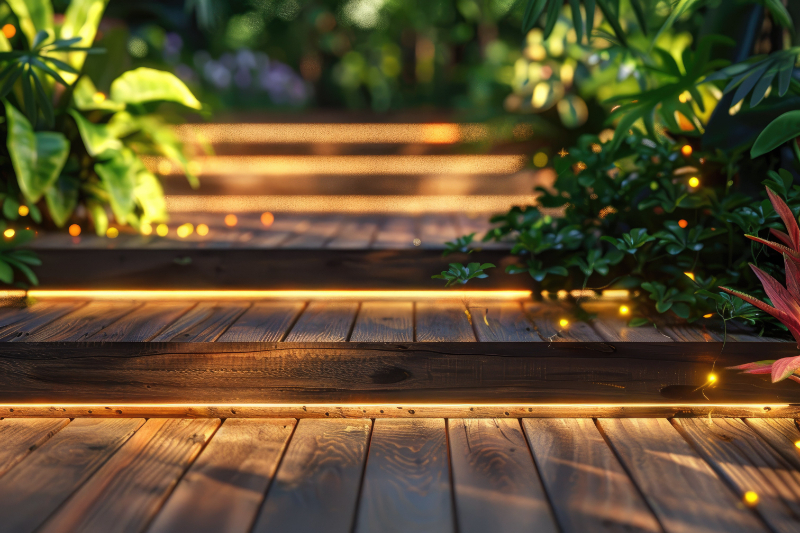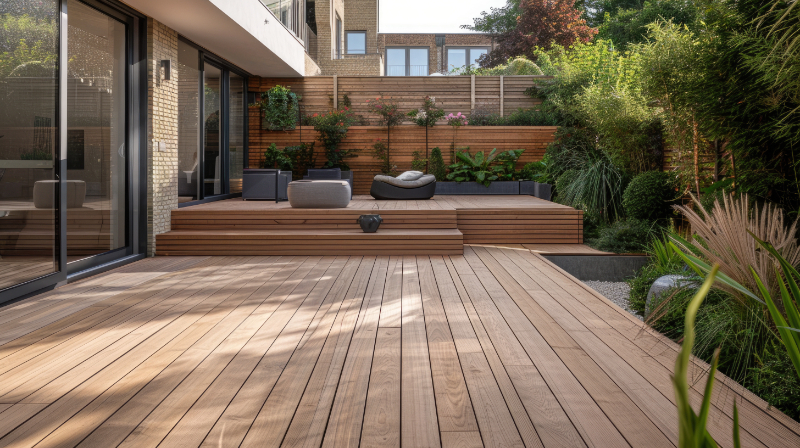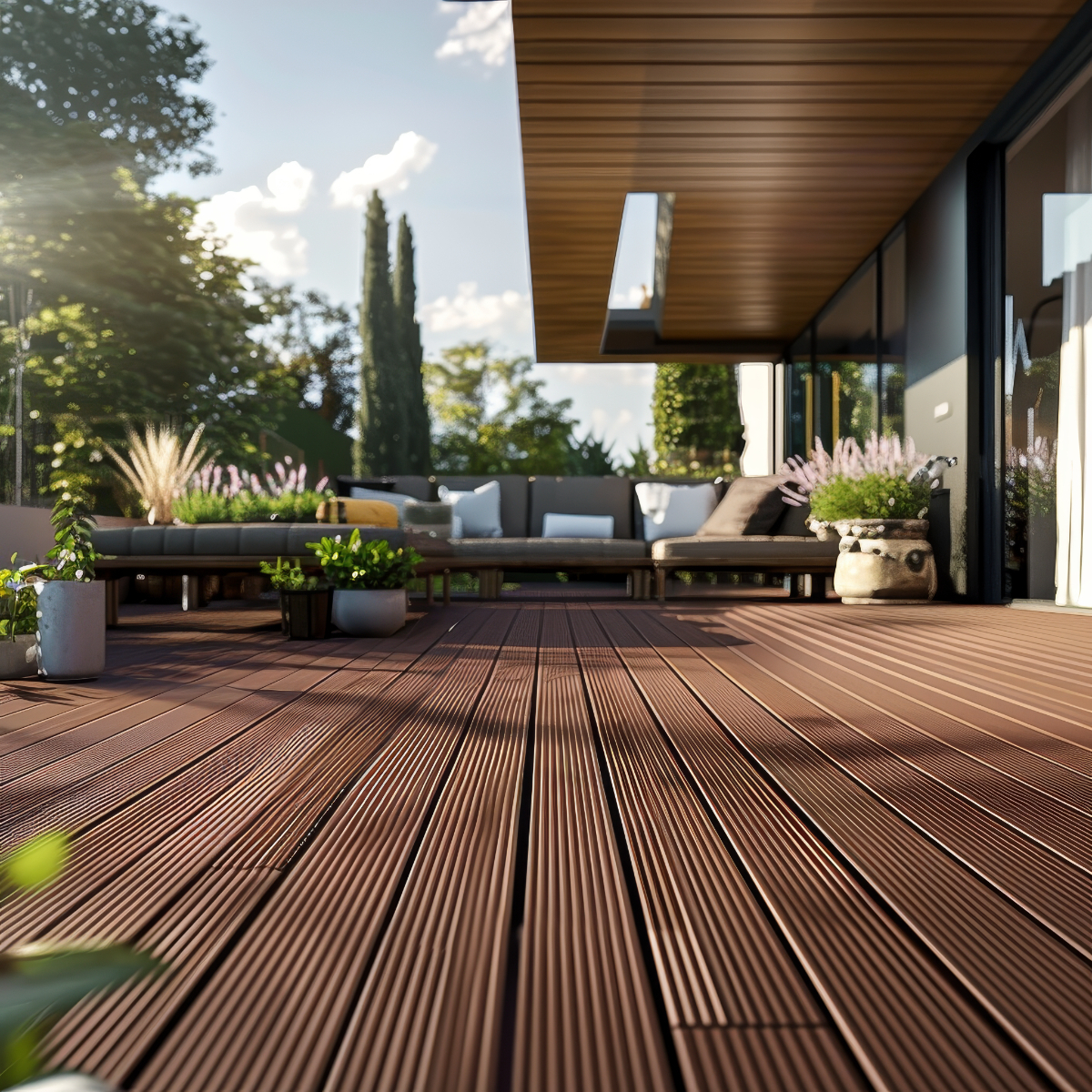Learn which hardwoods are best for timber decking. Discover durable, weather-resistant options like teak, oak, and ipe that provide long-lasting, beautiful decking solutions for outdoor spaces.
Oak Is The Most Used Hardwood For Decking
Oak wood is the most commonly used hardwood for timber decking due to its durability. Oak is extremely strong, making it an ideal choice for decking that needs to withstand heavy use.
Oak wood is also highly resistant to decay. This natural resilience ensures that the decking can maintain its appearance over time. The visual appeal of oak wood also contributes to its use.
Another reason oak is commonly used is its cost-effectiveness compared to other hardwoods. Oak's versatility means it can be used in many decking projects without breaking the bank. This makes oak an excellent choice for those who want a high-quality decking material without a high price tag.
Oak's adaptability ensures it fits seamlessly within a wide range of design aesthetics. Oak is both attractive and durable, making it the preferred choice for homeowners. Oak is one of the most used hardwoods for decking due to its strength, resistance and timeless beauty.
Benefits Of Using Ipe For Timber Decking
When it comes to timber decking, ipe wood stands as one of the best. Ipe is impressively strong and durable, making it an ideal choice for decking. Originating from South America, ipe is known for its dense composition, which makes it resistant to moisture, decay, and insects.
When it's properly maintained ipe decking can last up to 75 years, outlasting many other types of wood. This means that, although ipe may have a higher initial cost, its long-term value makes up for it.
Homeowners who invest in ipe decking can expect it to stay beautiful and functional for decades. Ipe is naturally resistant to mould and fungi, reducing the need for chemical treatments that other woods may need. This trait extends the lifespan of the decking and makes it an eco-friendly choice.

Another compelling feature of ipe is its excellent non-slip texture. This aspect is crucial, especially in wet conditions where slipping is more common. The non-slip texture of ipe decking helps to reduce the risk of accidents. Ipe is also prized for its stunning appearance. The rich, deep colour, adds an element of luxury to any decking project.
Over time, if left untreated, ipe will age gracefully to a silver-grey patina. However, to maintain the wood's original colour, you can apply a UV-blocking oil finish. One of the challenges with ipe wood is its density, which makes it somewhat difficult to work with. Cutting and drilling ipe requires special tools and expertise. As a result, professional installation is often recommended to ensure the best results.
Additionally, the wood must be pre-drilled before installation to prevent splitting. While ipe requires less maintenance, it is not entirely maintenance-free. Regular cleaning and re-oiling will keep the wood looking its best for longer. However, this minimal maintenance is a small price to pay for the many advantages that ipe offers.
Teak Wood
Teak hardwood is commonly used in timber decking, and for good reason. One of the benefits of teak is its durability and superior weather resistance. This makes it an excellent choice for environments that are exposed to the elements. Teak’s natural oils act as a barrier against rot, insects, and decay - meaning it needs less maintenance.
Teak is aesthetically pleasing as well. Teak starts out with a beautiful golden-brown hue before ageing into a silvery-grey. The wood’s straight grain and smooth texture add to its visual appeal and make it a comfortable surface to walk on. Despite its higher initial cost, teak is cost-effective in the long run. However, teak wood needs to be installed by professionals to ensure a quality finish.
Additionally, it's crucial to ensure that the teak has been sourced sustainably. Always look for certifications or guarantees from suppliers to ensure the wood's origins are eco-friendly. While teak comes with a higher price tag, its durability and appeal make it ideal for decking.
Cumaru Wood
Cumaru wood is known for its strength and density - making it perfect for timber decking. One of cumaru wood advantages is its natural resistance to moisture and decay. This resistance ensures that the decking remains in excellent condition for many years.
However, one challenge with cumaru wood is its density, which can make it difficult to work with. Due to this, professional installation is recommended to ensure it's fitted properly. Additionally, like all hardwoods, it's crucial to consider the sustainability of cumaru wood. Responsible sourcing is essential to ensure the wood is harvested sustainably. Despite these considerations, cumaru remains an ideal choice for decking due to its resistance.
Why Use Hardwoods For Timber Decking?
Hardwoods are a popular choice for decking due to their durability and strength. Unlike softwoods and composite materials, hardwoods like oak, teak, and cumaru can withstand the wear and tear of outdoor environments far better. They also display exceptional resistance to rot, decay, and insect attacks.
In terms of aesthetics, hardwoods provide a wide range of colours and grain patterns. The rich textures and natural beauty of hardwoods can enhance the look of any decking. This makes them especially appealing for homeowners who want their decking to be functional and appealing.

Moreover, hardwood decking boards tend to be more resilient against damage. They can handle foot traffic and weather conditions better than softwoods or composites. This resilience means they have a long-lasting lifespan, making them a cost-effective choice. One of the key benefits of using hardwoods like oak, ipe, teak, and cumaru is their non-slip surface. This feature is crucial in outdoor areas, as it helps to prevent accidents and injuries.
Choosing the right decking timber involves considering the specific requirements of your project. Hardwoods are appealing, durable, and low maintenance - making them an ideal choice for many homeowners.
While they may be more expensive, the long lifespan of hardwoods makes them a more economical option. When choosing hardwoods for decking, always ensure that they are sourced responsibly. Look for certifications that show the wood is harvested sustainably. This helps to protect forests and support ethical practices in the timber industry.
Additionally, the robust nature of hardwoods means that they don't need to be chemically treated, unlike many softwoods. In conclusion, hardwoods are an excellent choice for decking due to their aesthetic appeal and longevity. Their resistance to rot, combined with their strength, make them a practical option.
Are you looking for a timber merchants in Stockport and Manchester? We offer a range of timber products for Manchester, Liverpool, Preston, Oldham, Stockport, Warrington and the surrounding areas.

